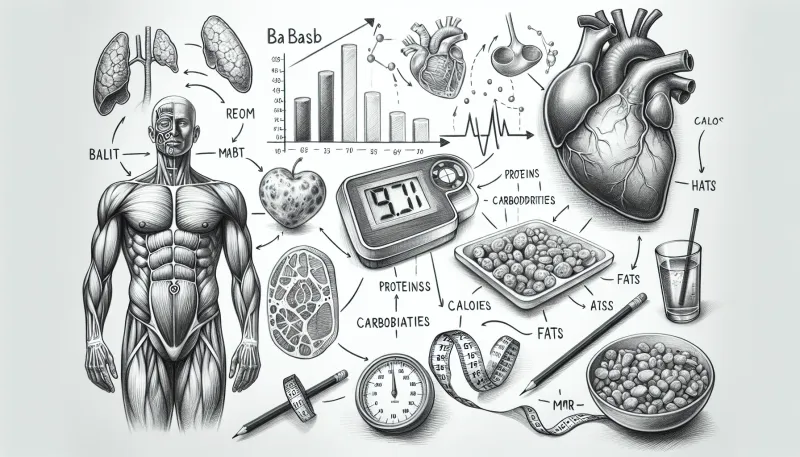Understanding Basal Metabolic Rate (BMR): What You Need to Know

Discover everything you need to know about Basal Metabolic Rate (BMR), including how it works, factors influencing it, and how to calculate yours for optimal health and fitness.
Basal Metabolic Rate (BMR) is a term frequently encountered in discussions about health, fitness, and weight management. Understanding your BMR can help you make informed decisions about your diet and exercise routines, contributing to better overall health.
What is Basal Metabolic Rate (BMR)?
Basal Metabolic Rate (BMR) refers to the number of calories your body needs to maintain basic physiological functions while at rest. These functions include breathing, circulation, cell production, nutrient processing, protein synthesis, and ion transport. Essentially, BMR represents the minimum energy requirement needed to keep your body functioning in a resting state.
Factors Influencing BMR
Age
As you age, your BMR typically decreases. This natural decline is largely due to the loss of muscle mass and changes in metabolic activity over time.
Gender
Men usually have a higher BMR than women. This difference is primarily because men generally have more muscle mass and less body fat compared to women, both of which influence BMR.
Body Composition
Muscle tissue burns more calories than fat tissue even at rest. Therefore, individuals with more muscle mass will have a higher BMR.
Genetics
Genetics play a significant role in determining an individual's BMR. Some people are naturally predisposed to a higher or lower BMR.
Hormonal Factors
Hormones such as thyroxine and insulin have a significant impact on BMR. Thyroid hormones in particular are critical for regulating energy expenditure.
Environmental Temperature
Exposure to extremely cold or hot environments can increase BMR as the body works harder to maintain a normal temperature.
How to Calculate Your BMR
Calculating your BMR involves a formula that factors in age, gender, weight, and height. The most commonly used equations are the Harris-Benedict Equation and the Mifflin-St Jeor Equation.
The Harris-Benedict Equation
- For Men: BMR = 88.362 + (13.397 x weight in kg) + (4.799 x height in cm) - (5.677 x age in years)
- For Women: BMR = 447.593 + (9.247 x weight in kg) + (3.098 x height in cm) - (4.330 x age in years)
The Mifflin-St Jeor Equation
- For Men: BMR = (10 x weight in kg) + (6.25 x height in cm) - (5 x age in years) + 5
- For Women: BMR = (10 x weight in kg) + (6.25 x height in cm) - (5 x age in years) - 161
Once you have your BMR, you can determine your total daily energy expenditure (TDEE) by multiplying your BMR by an activity factor, which ranges from sedentary to very active.
Why BMR is Important for Weight Management
Understanding your BMR can significantly aid in weight management. By knowing how many calories your body needs to function at rest, you can better plan your diet and exercise routines to either maintain, lose, or gain weight.
Caloric Intake
If your goal is to lose weight, you will need to consume fewer calories than your TDEE. Conversely, if you aim to gain weight, you should consume more calories than your TDEE.
Avoiding Extreme Diets
Understanding BMR can help you avoid extreme diets that drastically reduce caloric intake, which can lower your BMR and make it harder to maintain weight loss.
Ways to Boost Your BMR
While you can't control certain factors like age and genetics, you can adopt habits that may help boost your BMR.
Build Muscle Mass
Engaging in strength training exercises can help increase muscle mass, which in turn can boost your BMR.
Stay Hydrated
Water is essential for a well-functioning metabolism. Dehydration can slow down your BMR.
Eat Small, Frequent Meals
Consuming small, frequent meals throughout the day can help maintain a steady metabolism and prevent drastic drops in BMR.
Get Enough Sleep
Lack of sleep can negatively impact metabolic function. Ensure you're getting 7-9 hours of sleep per night to keep your BMR at optimal levels.
Avoid Crash Diets
Extremely low-calorie diets can lead to a significant decrease in BMR. Instead, aim for a balanced diet that provides an appropriate caloric intake.
Common Misconceptions about BMR
There are several misconceptions around BMR that can lead to confusion and ineffective weight management strategies.
Lowering Caloric Intake Drastically Increases Weight Loss
Drastically reducing caloric intake can lead to a decrease in BMR, making weight loss harder over time.
Exercise Alone is Enough to Increase BMR
While exercise, particularly strength training, can boost BMR, it's not the only factor to consider. Proper diet and lifestyle habits are equally important.
BMR Remains Constant
BMR can change over time due to various factors such as age, hormonal changes, and alterations in body composition.
Conclusion
Understanding your Basal Metabolic Rate (BMR) is crucial for making informed decisions about your health and fitness. By knowing the fundamental principles behind BMR, calculating your own, and understanding the factors that influence it, you can better manage your weight and overall well-being. Remember, while some factors affecting BMR are beyond your control, lifestyle choices related to diet, exercise, and hydration can make a significant difference. Stay informed, make conscious decisions, and you'll be on your way to a healthier and happier life.



























